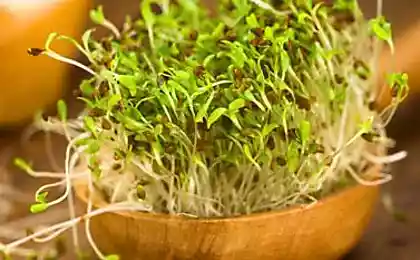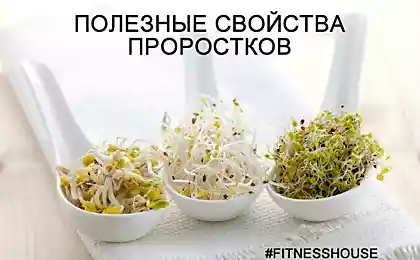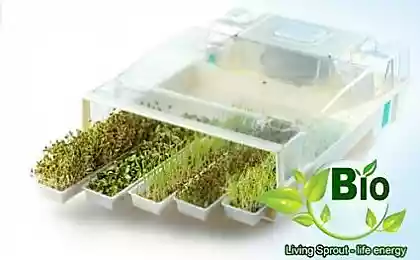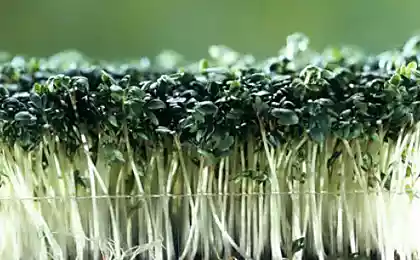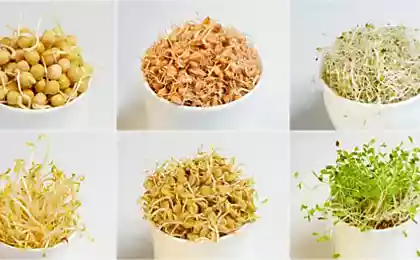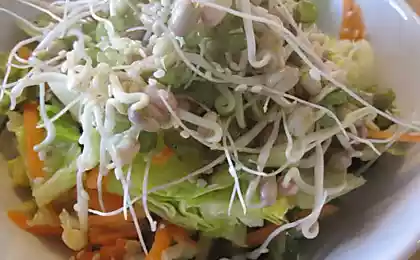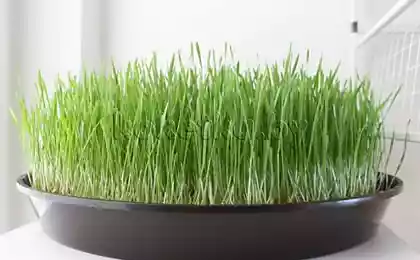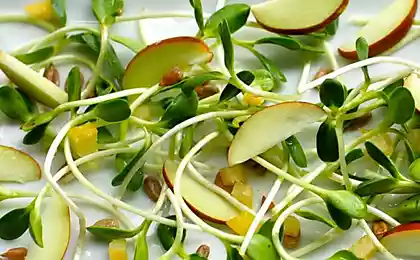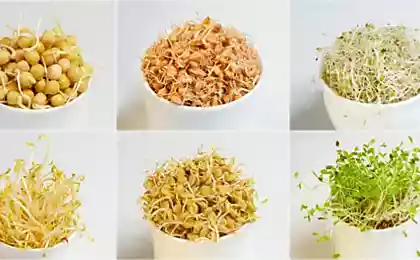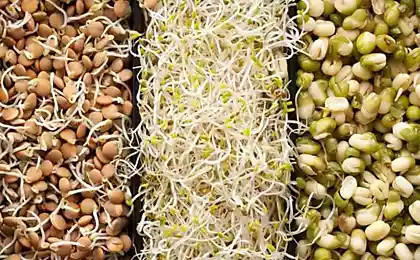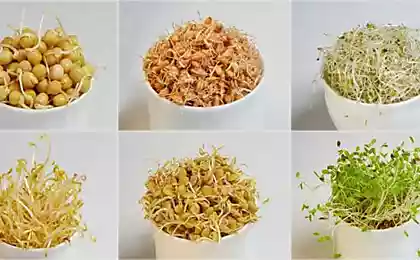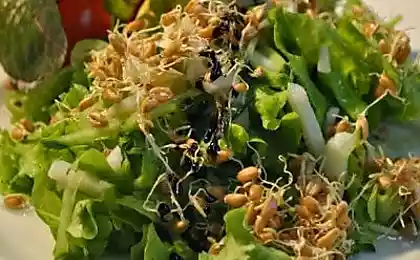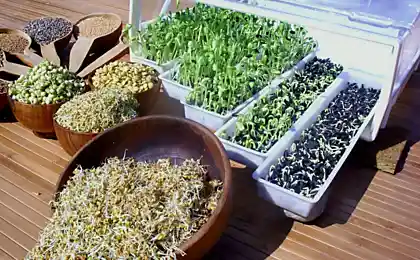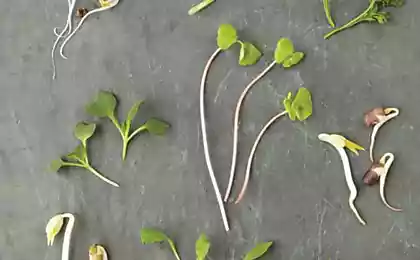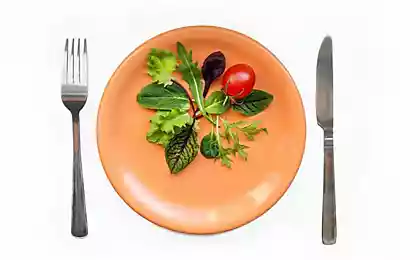720
Sprouts — an ancient health remedy
Sprouted grains from the point of view of yogaSprouts – an ancient health remedy, has been known for over five thousand years. This natural healing food relates to so-called biogenic foods and has the amazing ability to deliver us from many diseases, preventing their return. True health is what gives us this gift of Nature.The exceptional value of the sprouted seed that sprouts only "live" food. Their inclusion in the diet — a unique opportunity for a person to consume a holistic living organism that possesses all the natural biological properties and are in the phase of maximum vitality. This period lasts only a few days and at this time they need to use people to get from this extraordinary product strength and health. 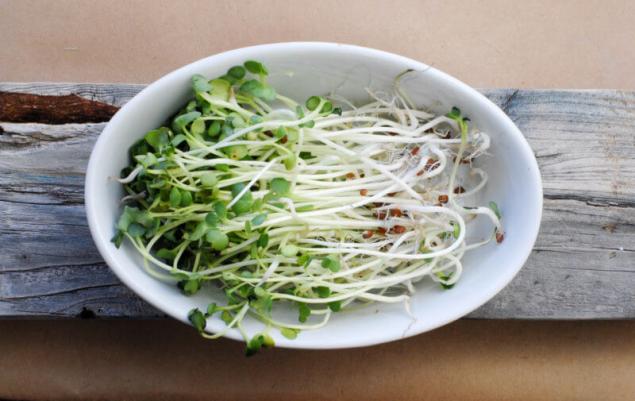
Sprouted seeds represent a huge energy potential. Adding them to food, we get a powerful energy boost. Enzymes in seedlings, spare break down proteins, fats and carbohydrates for these seeds, we are facilitating their learning, and continue to work in the human body, saving his inner strength. The total content of antioxidants and vitamins increases during germination many times, they are embedded in the organic system the living tissue of the plant and work are interrelated, supporting and reinforcing each other's action.
Regular consumption of seedlings stimulates metabolism and blood, improves the immune system, compensates for vitamin and mineral deficiency, normalizes the acid-alkaline balance, cleanses the body of toxins and efficient digestion, increases the potency, slows the aging process. Sprouted seeds are especially useful to children and the elderly, pregnant women and nursing mothers, people of intense mental and physical labor.
In addition to General positive effects on the human body, seedlings of each culture, having in its composition a certain set of nutrients, vitamins and minerals, have a specific healing effect and are recommended for people suffering from these or other ailments.
One of the doctors, yogis Gisela Schmidt from Switzerland, bringing his study up to the end, including myself, wrote the following lines:
"I started taking sprouted grains of wheat for Breakfast when I was 54 years old. After a few months, my gray hair's original color, became elastic and thick. Vision fully recovered, and my physical and spiritual strength. This status allows me to work in full force, and to this day, when I turned 75."
Wheatgrass
Proteins (26%), fats (10%), carbohydrates (34%) germinating seeds are easily digested by our body. The amount of trace elements and vitamins during germination increases significantly. Wheatgrass contain potassium (850 mg/100 g), calcium (70 mg/100 g), phosphorus (1100 mg/100 g), magnesium (400 mg/100 g), iron (10 mg/100 g), zinc (20 mg/100 g), vitamin B1 (2 mg/100 g), B2 (0.7 mg/100 g), B3 (4.5 mg/100 g), B6 (3.0 mg/100 g), E (21,0 mg/100 g) and folic acid (0.35 mg/100 g). The amount of vitamin C increases during germination from 1.07 to 10.36 mg/100g.
The total content of antioxidants (CCA) in the process of seed germination of this plant is increased in 11,5 times, and reaches on the fifth day 275 mg/100g.
Recommended in the treatment of chronic colitis, gastritis and gastroduodenitis, purify the liver, kidneys, bladder, intestines; in the complex treatment of gastric ulcer and duodenal ulcer (contraindicated during acute exacerbations). Fiber (sheath of grain) normalizes the work of gastrointestinal tract and beneficially affect the intestinal flora. Wheatgrass improve blood and nervous systems, eases the effects of stress. Indicated in the treatment of allergies, diabetes and obesity. Substances contained in it strengthen the immune system and provide us with energy, help to relieve swelling, heal wounds and ulcers; improve the condition of skin and hair.
Wheatgrass cleanse our body from years of "debris", but this requires to use them at least a year.
Relatively rapid changes occur with hair: they look better than after the use of expensive shampoos and masks. Wheat sprouts prevention of dental caries, cancer, improve the body's tone, soothe the nerves and improve sleep.
The seedlings of oats
Most varieties of this crop floral scales grow to the grain and therefore the usual the seedlings can not be obtained. To obtain seedlings of oats it is necessary to use special varieties of seeds that have grain freely separated from the flowering glumes.
The seedlings of oats in many ways superior to the seedlings of other cereals, because the oat grain is characterized by an optimal ratio of protein (9-20%), fats (11%), carbohydrates (40%) and b vitamins Oats contains a lot of soluble fiber, vitamins E and K, is a source of calcium, iron, magnesium, sulfur, silicon, chromium, zinc, fluorine, iodine. The amount of vitamin C increases during germination with 0,88 to 23.71 mg/100g.
The total content of antioxidants (CCA) in the process of seed germination of this plant is increased in 9,8 times, and reaches on the fifth day 334 mg/100g.
The seedlings of oats is very effective for many serious health problems: tuberculosis, diseases of the kidneys, liver and gall bladder, hepatitis, diseases of the thyroid gland. You can use them to recover faster after injuries and long illness: they restore immunity, strengthen muscles, normalize the stomach and intestines and update the composition of the blood. The latter property is very effective for the prevention of blood clots and the development of such dangerous diseases as thrombosis.
Sprouted beans
Sprouted beans have a diuretic, anti-inflammatory and astringent, promotes healing of wounds, improve skin condition and complexion; germinated peas useful for those who want to lose weight – it is low in calories, but fills it well.
Germinated seeds of chickpeas (chickpeas, chickpeas), 30% protein, 7% fat, carbohydrates, lecithin. Rich in fiber (up to 22%). Different from seeds of other crops are very low in calories – only 120 kcal/100 g. Contain vitamins B1, B3, B5, Biotin, B6, folic acid (0,65 mg/100 g), of the precious trace elements – boron, silicon, manganese, iron. The amount of vitamin C increases during germination from 2.04 to 36,14 mg/100g.
The total content of antioxidants (CCA) in the process of seed germination of this plant is increased in 5.9 times, and reaches on the fifth day 503 mg/100g. It makes the sprouts of chickpea by-product that can be used in autumn and winter to prevent flu and colds. They are useful for those who have problems with excess weight.
Chickpea sprouts have a distinctive nutty flavor. They can be used both separately and adding cold snacks.
Germinated pea seeds mung bean (Golden bean) 24-28% protein, 46-50 percent starch, 2-4% fat. The amount of vitamin C increases during germination with 6.35 to 42,32 mg/100g. The total content of antioxidants (CCA) in the process of germination of seeds of this plant increased 5.1 times and reaches on the fifth day of 517 mg/100g.
Golden gram sprouts, and sprouts of chickpea, it is advisable to use autumn and winter to prevent flu and colds. Golden gram sprouts – a wonderful additive to salads and vinaigrettes.
The sprouts of barley
In barley seed proteins (14%), that its values are superior to wheat proteins, fats (2%), carbohydrates (67%).
The amount of fiber increased during germination from 1.5% to 4.9%. Contain b vitamins, vitamins E and R. the barley Sprouts are a good source of calcium (188 mg/100 g), phosphorus (281 mg/100 g), iron (3.9 mg/100 g), zinc (3,64 mg/100 g), also contain potassium, manganese, sulfur, copper, selenium. The amount of vitamin C increases during germination from 3.67 mg/100 g to 20.25 mg/100 g.
The total content of antioxidants (CCA) in the process of germination of seeds of this plant increased 6.5 times, and reaches on the fifth day 389 mg/100 g On this important indicator seedlings hulless barley ranks first among the cereal seedlings described above.
The sprouts of barley improve immunity, cleanse the body of toxins, have shielding, anti-inflammatory, diuretic. Recommended as a tonic and tonic, as well as with hypovitaminosis, obesity, diabetes, dysbiosis. They increase stamina and lead to normal acid-alkaline balance.
Buckwheat sprouts produced from seeds which are not heat treated and with which the shell (husk) is removed carefully so that the embryo is not damaged.
In buckwheat seeds 10-18% protein, 2.4 to 3% fat, 59-82% carbohydrates, 12 to 16% of fiber. Contain phosphorus (up to 330 mg/100 g), potassium (380 mg/100 g), calcium, magnesium (200 mg/100 g), manganese (1,56 mg/100 g), cobalt (3 mg/100 g), boron, silicon, vanadium, iron (8 mg/100 g), copper, zinc (2.05 mg/100 g), mo. Rich in vitamins B1 (to 0.58 mg/100 g), B2, B3 (4,19 mg/100 g), B6 (0,4 mg/100 g), E (0,2-6,7 mg/100g) also contain vitamin K and carotene. The amount of vitamin C increases during germination from 1.49 to 26.4 mg/100g.
The total content of antioxidants (CCA) in the process of germination of seeds of this plant increased 2.1 times and reaches on the fifth day 383 mg/100g.
The seeds of buckwheat seeds are superior to all other cultures on the concentration of rutin — a bioflavonoid that has the ability to improve the condition of blood vessels, especially capillaries, strengthening them thin walls.
Germinated seeds of buckwheat are recommended for the prevention and treatment of various vascular diseases (atherosclerosis, coronary heart disease, hypertension) and infectious diseases, occurring with a lesion of the vascular system (measles, scarlet fever, sore throat, fever), to decrease intraocular pressure in simple glaucoma, varicose veins and hemorrhoids.
It is useful to add them to the diet in the treatment of radiation sickness, diseases of the liver and kidney, obesity, diabetes, bleeding from the nose and gums, the loss of blood.
Sprouted rye
Grains contain proteins (13%), fats (2%), carbohydrates (69%) and fiber. They have a lot of potassium (425 mg/100 g), calcium (58 mg/100 g), phosphorus (292 mg/100 g), magnesium (120 mg/100 g), manganese (2.7 mg/100 g), iron (4.2 mg/100 g), zinc (2.5 mg/100 g), there is also fluorine, silicon, sulfur, vanadium, chromium, copper, selenium, molybdenum. Contain more vitamin E than wheat (10 mg/100 g) and vitamins B1 (0.45 mg/100 g), B2 (0,26 mg/100 g), B3 (1.3 mg/100 g), B5 (1.5 mg/100 g), B6 (0,41 mg/100 g), folic acid (0.04 mg/100 g), vitamin K, and R. the Amount of vitamin C increases during germination from 0.58 to 14.68 mg/100g.
The total content of antioxidants (CCA) in the process of seed germination of this plant is increased in 11.0%, and reaches on the fifth day 320 mg/100g.
Its action is similar to the wheat shoots: compensate for vitamin and mineral deficiencies, stimulate work of bowel, increase peristalsis, normalize microflora, and have a slight laxative effect, help cleanse the body of toxins. Rye sprouts are shown in the same cases as the wheat germ.
Sprouted rye helps the body to actively resist microbes and viruses, improves elimination of sputum in diseases of the respiratory tract, normalizes the level of glucose in the blood, removes toxins and radionuclides, prevents the development of atherosclerosis and early aging.
Sprouted pumpkin seeds - one of the most valuable sites for germination. It contains a wide range of nutrients and trace elements. In the seeds up to 28% of valuable plant proteins to 46.7% of fat and soft tissue. They have a lot of phosphorus (1174 mg/100 g), magnesium (535 mg/100 g), manganese (3 mg/100 g), iron (14,9 mg/100 g), zinc (10 mg/100 g), selenium (5.6 mg/100 g) and calcium silicon, chromium, cobalt, copper, vitamins B1, B2, E, folic acid (0,06 mg/100 g), carotene. The amount of vitamin C increases during germination from 2.65 to 31,29 mg/100g.
The total content of antioxidants (CCA) in the process of germination of seeds of this plant increases to 10.1%, and reaches on the fifth day 333 mg/100g.
The pumpkin seedlings have an active vermifuge effect, are successfully used for the prevention and treatment of giardiasis and various helminth infections, particularly effective against tapeworms and pinworms. Preferably anthelmintic non-plant origin, recommended for children, pregnant women and people older than 60 years.
The regular use of sprouts pumpkin normalize the separation of bile, activates water-salt metabolism, have a beneficial effect on the reproductive system of men and women, stimulate the function of sexual glands, improves the function of the urinary tract, strengthen the muscles of the bladder, in men increase the potency, provide excellent support for the prostate. Useful to men after 45 years for the prevention of prostatitis in the complex treatment of chronic prostatitis and benign prostatic hyperplasia.
Contained in seedlings of pumpkins zinc, necessary for normal functioning of the brain, a positive effect on mental activity of the person, strengthens the memory, reduces fatigue, and irritability, normalizes sleep. Sprouts pumpkin — a valuable product for the prevention and treatment of ailments caused by prolonged physical and psychological overload. Extremely useful to students, especially the younger classes, to overcome stressful situations and better absorption of the material.
Sprouts sunflower
the most valuable natural concentrate of high-quality vegetable protein, essential fatty acids, a wide range of trace elements and vitamins.
In the seeds up to 59% fat, valuable plant proteins, carbohydrates, fiber, lecithin. Contain potassium (647 mg/100 g), calcium (57 mg/100 g), phosphorus (860 mg/100g), magnesium (420 mg/100 g), iron (7.1 mg/100 g), zinc (5.1 mg/100 g), selenium (0.07 mg/100 g), iodine (0.7 mg/100 g), fluorine, silicon, chromium, manganese, cobalt, copper, molybdenum. Are one of the richest sources of vitamin E (to 21.8 mg/100 g), vitamin B1 (2.2 mg/100 g), B2 (0.25 mg/100 g), B3 (up to 5.6 mg/100 g), B5 (up to 2.2 mg/100 g), B6 (1.1 mg/100 g), Biotin (0,67 mg/100 g), folic acid (1 mg/100 g) contain vitamins D and F. the Amount of vitamin C increases during germination from 1.64 to 14.48 mg/100g.
Sprouts sunflower normalize the acid-alkaline balance in the body, to compensate for vitamin and mineral deficiencies. Strengthen the nervous system, eases the effects of stress, prevent blood clots, improve the condition of the mucous membrane of the gastrointestinal tract.
Recommended in complex treatment of gastric ulcer and duodenal ulcer in remission, atherosclerosis and related diseases of the heart and brain, in pathological menopause. Contribute to the preservation of memory, good eyesight, improve skin and hair.
Lentil sprouts - very useful and tasty product. Seeds of lentils — good source of protein (35 mg/100 g), carbohydrates, fiber. Contain potassium (1500 mg/100 g), calcium (83 mg/100 g), magnesium (380 mg/100 g), iron (7 mg/100 g), zinc (5 mg/100 g), selenium (0.06 mg/100 g), boron, fluorine, silicon, sulfur, manganese (1.3 mg/100 g), copper, molybdenum. The seeds vitamins B1, B3, B5, Biotin, B6, folic acid. During germination of lentil in them significantly increases the content of vitamins B1, B6, Biotin, folic acid. The amount of vitamin C increases during germination from 2.83 to 64,41 mg/100g.
The total content of antioxidants (CCA) in the process of germination of seeds of this plant increased 2.1 times and reaches on the fifth day of 90 mg/100g.
It makes lentil sprouts product, indispensable for the prevention of flu and colds during the autumn-winter period. Contribute to blood formation, increase the level of hemoglobin.
The seedlings of Thistle
Milk Thistle is known as a plant, regenerating and revitalizing cells of the liver. Its sprouts contain flavonoids is a very active substances that protect our cells; minerals, including selenium and zinc; vitamins A, E, F, K, and D. Their use improves the process of formation and excretion of bile, protects the liver from toxins and infections. Sprouts milk Thistle helps in the treatment of many diseases of the liver – both acute and chronic; allergies, colitis, hemorrhoids; reduce inflammation in the gall bladder and spleen, help dissolve and remove stones.
Exceptional value of sprouted seeds is that they are “alive” food. Adding sprouts to your diet — a unique opportunity for a person to eat a holistic living organism that possesses all the natural biological properties in the phase of maximum vitality. This period lasts only a few days and at this time they need to use people to get from this extraordinary product strength and health.
Sprouts flax is a wonderful product with a wide spectrum of healing actions. Actively increase the body's resistance, and give strength and vigor, support the work of each cell.
Flax seed oil (52%), proteins, carbohydrates, a lot of phosphorus (700 mg/100 g), magnesium (380 mg/100 g), iron (7.7 mg/100 g), zinc (5.7 mg/100 g) and calcium (1400 mg/100 g) is comparable with the sesame seeds. Contain vitamins E, K, F, B1, folic acid, carotene. The amount of vitamin C increases during germination from 1.35 to 22.47 mg/100g.
The total content of antioxidants (CCA) in the process of seed germination of this plant is increased 9.4 times and reaches on the fifth day 526 mg/100g.
The sprouts of flax, and seeds, have a unique sliminess and effectively cleanse the gastrointestinal tract. Accelerate the digestion, increase peristalsis, absorb toxins, have a mild laxative effect, help hemorrhoids.
Due to the high calcium content shows like sesame sprouts, women during pregnancy and breastfeeding, children in the period of intensive growth and change of teeth. Recommended to strengthen bone and tissue, spinal osteochondrosis, osteoporosis, in the treatment of fractures.
Flax oil ranks first among all vegetable fat content valuable a-linolenic acid (60%), is present in him and linoleic acid. Their complex is necessary for the growth and development of the body, as they participate in building the membranes of cell walls. These fatty acids strengthen the structure of the mucous membranes, restore the elasticity and strength of muscles and blood vessels destroying cholesterol deposits. Support brain function, nervous system and glands of internal secretion.
Sprouts flax is indicated for the treatment of cardiovascular diseases, hypertension, thrombophlebitis, varicose veins. Improve the condition of skin, hair and nails. Reception sprouts of flax blends in perfectly with the reception of the sprouts of milk Thistle.
The sprouted sesame seeds to 40% high quality protein, and 65% oil. The sesame sprouts strengthens the bone tissue, which is associated with the number of its constituent macro - and micronutrients. The content of calcium (up to 1474 mg/100 g) sesame seeds superior to all foods, even many cheeses. The seeds also contain potassium (497 mg/100 g), phosphorus (616 mg/100 g), magnesium (540 mg/100 g), iron (10.5 mg/100 g), zinc, vitamins B1 (0,98 mg/100 g), B2 (0.25 mg/100 g), B3 (5.4 mg/100 g). The amount of vitamin C increases during germination from 2.15 to 34.67 mg/100g.
The total content of antioxidants (CCA) in the process of seed germination of this plant is increased in 1.7 times, and reaches on the fifth day 490 mg/100g.
Included in the sesame trace elements necessary for normal human functioning of the musculoskeletal system, stomach, liver, pancreas and intestines. The sesame sprouts strengthen the skeleton, teeth and nails, regular intake helps to restore tooth enamel.
Reception sesame sprouts are recommended in acute and chronic arthritis and arthrosis, osteochondrosis, osteoporosis, especially in women after 45 years. Indicated in the treatment of fractures and injuries of the musculoskeletal system. Absolutely necessary for women during pregnancy and breastfeeding, children in the period of intensive growth and change of teeth.
Seedlings milk Thistle is a powerful herb of the family Asteraceae height of 150 see a Weed, although in recent years, due to exceptional medicinal properties, it began to cultivate and to obtain from the seeds of a variety of drugs — silibor, silibinin, silimar, an oil solution, a powder.
Seedlings Thistle — live green seedlings with a length of 1.5-2 cm at the age of 6-7 days.
The seeds of milk Thistle contain fats (30-40%), essential oils, resins, mucilage, vitamins a, D, E, K, F, macro - and micronutrients: potassium, calcium, magnesium, iron, aluminum, vanadium, chromium, manganese, zinc, selenium and copper. The amount of vitamin C increases during germination from 2.02 to of 49.05 mg/100g.
The total content of antioxidants (CCA) in the process of seed germination of this plant is increased 3.8 times, and reaches on the fifth day 896 mg/100g.
Health properties of milk Thistle are mainly related to the presence in its seeds up to 1% special vitamin-like substances — flavonoids (silymarin, silybin, etc.), These flavonoids are powerful antioxidants that prevent damage to healthy cells, are involved in redox processes, increases the activity of various enzymes.
Milk Thistle is a powerful hepatoprotective, meaning it protects the liver. Increases the formation and excretion of bile, stimulates regeneration of liver cells, prevents the violation of the structure and function of the liver in various pathologies. Reduces the damaging effects of drugs and toxic substances that enter the human body from the environment. Milk Thistle stimulates the gastrointestinal tract, has beneficial effects on the kidneys, anti-inflammatory and healing action.
Living seedlings Thistle have a special healing power. Indicated for inflammation of the gall bladder, inflammatory diseases of the pancreas and spleen, colitis and gastric ulcers. Effective in the treatment of seedlings of milk Thistle patients suffering from hepatitis "C".
As a preventive measure seedlings milk Thistle is very useful for inhabitants of the big cities and people working in hazardous industries.
Sprouted amaranth seeds
a plant that provides shlakobetonnye grain with a high content of vitamins and minerals, possess a valuable set of biologically-active substances, high protein, balanced essential amino acids. The UN food Commission has called amaranth culture of the XXI century.
Amaranth seeds, along with other important components of the human body, contain squalene and phytosterols. Squalene inhibits the growth of cancer cells, strengthens the immune system. Phytosterols can significantly reduce cholesterol in the blood.
Amaranth seeds contain an average of 15-17% protein, 5-8% fat and 3.7-5.7% of the fiber, vitamins B1, B2, E, D, phosphorus, calcium, rutin, phospholipids, bile acids, a large number of amino acids (especially lysine). Lysine in the protein of amaranth twice more than wheat and three times more than maize and sorghum. As we know, lysine is an essential amino acid valuable, as in animal tissues it is not synthesized, and enters the body only with food. With a lack of lysine food is just not digested and protein "passes" the body in transit.
The total content of antioxidants (CCA) in the process of seed germination of this plant is increased in 20 times and reaches on the fifth day 200mg/100g.
If you assess the perfect protein (close to eggshell) with 100 points, the milk protein casein will have 72 points, soy 68, wheat – 58, corn – 44, and amaranth – 75 points. The content of such amino acids as threonine, phenylalanine, tyrosine and tryptophan, the protein of amaranth protein is equivalent to breast milk.
In amaranth seeds contain polyunsaturated fatty acids: linolenic, palmitic, stearic, linoleic, arachidonic.
Another valuable property of amaranth – the content easily digestible food fibres (cellulose, pectin). Dietary fibers adsorb various of harmful chemicals, including carcinogenic substances, bind and eliminate them from the body. The dietary fiber content of amaranth is superior to wheat in 3 times, corn, rice and oats by 1.5 times.
Amaranth seeds, unlike seeds of grain crops contain very little of glutelins. This is important for those who have hypersensitivity to products of grain due to enzyme deficiency, gidroliznaya glutelin, and therefore need to glutaminova diet.
Unique amaranth seeds make at least three features: the presence of squalene, vitamin E in the form of tocotrienol and a large amount of polyunsaturated fatty acids. Thanks to the balanced combination of nutrients, they normalize the hormonal system and improve metabolism, eliminate side effects after the use of drugs or other active methods of treatment; improve the function of liver and kidneys; reduce the manifestations of toxicity; normalize the indicators of urine and blood; positive effect on the mucous membrane of the stomach and bowels; restore cellular activity of the epithelium, and inhibit pathogenic microorganisms.
Sprouts in a jar
For germination take only good quality seeds are edible. Do not use seed: protravnogo (intended for planting); with the contents of the pests (bugs, etc.); mechanical damage (broken, chipped, etc.) with expired shelf life.
Preparation of seeds for germination
Each portion intended for germination, sorted, removing the trash, empty and damaged seeds. Further it 2-3 times washed in running water through a sieve. A portion of washed seeds placed in a jar (0.5-0.7 l) for 1/3 of its volume (for large seeds — 1/4) and fill with a weak solution of potassium permanganate (pink solution). Bottle opening cover with clean gauze and secured it with a rubber band. The ends of the gauze should hang at the edges of 5-6 cm Stand 5 minutes, poured the solution. Not pulling out cans and without removing the gauze, the seeds washed thoroughly with filtered water.
soaking of seeds
After disinfection the seeds fill with water so that it covers his 3-4 cm (gauze is not removed). The Bank put in place protected from direct sunlight. After 8-12 hours, when the seeds swell, the water is drained. Again disinfection. After the last wash the water is drained carefully. Seeds are ready for germination.
A jar of seeds in the horizontal state slightly shake, achieving a uniform distribution of seeds along the wall, and carefully put the side in a bowl with high edges so that the Bank relied to its side on the side (the angle of inclination should be around 45 degrees), and the ends of gauze lay on the bottom of the bowl (in the future they will wicks for suction of water). In a bowl (pan) pour the water layer of approximately 0.5 cm and maintain this level continuously until the “cutting” of seeds. All this “structure” is put in a warm place, hidden from direct sunlight. Thus, the seeds are in a mini-greenhouse: the ends of the gauze are working as a wick, constantly wetting the surface and keeping humidity at a Bank and the bottom prevents the evaporation of water. Breathing air seed passes freely through the gauze into the banks and back. This creates ideal conditions for germination: heat, high humidity, permanent air circulation.
When the seeds are “inexpensive” (approximately 8-12 hours), conduct a second disinfection and flushing. The water is thoroughly drained, remove the cheesecloth. The seeds are already possible and necessary to apply. The greatest healing power of seeds after 24-48 hours of germination, when the shoots are 1-2 mm. Seedlings stored in a refrigerator at a temperature of 5-7 OS. In the fridge they breathed and did not dry up, a jar with a lid with a hole 1 cm in diameter to Eat sprouts preferably 4-5 days.
Important! Daily sprouts, which are stored in the refrigerator, disinfected as described above. Disinfection is needed to ensure that your sprouts are not moldy. Otherwise they will simply lose their properties, and you run the risk of “enter the body” of poor quality food.
General rules of use of sprouts
Introduction in a diet of sprouted seeds requires specific conditions. Store sprouted seeds should in a refrigerator at temperature from +2 to +6ОС. If the section with such a regime is not, packages of sprouts should be moved closer to the freezer. In these conditions, the germinated seeds of all crops will grow, but more slowly than at room temperature. However, their quality as a useful product improves the synthesis of vitamins and enzymes, breakdown of complex spare substances, increasing the amount of fiber.
Incorrect is the view that sprouts (e.g., wheat) may be consumed only at the beginning of germination, while the hatched length of the spine will not exceed 1-2mm.
Use the sprouts should be within 5 days. For seedlings of most crops this period is characterized by maximum vital activity. That they at this time are rising, the consumer should not be confused. Use them in your food should be whole, with roots and rudimentary leaves. published
P. S. And remember, only by changing their consumption — together we change the world! ©
Join us in Facebook , Vkontakte, Odnoklassniki
Source: www.all-yoga.ru/page/prorosshee-zerno-s-tochki-zrenija-jogi

Sprouted seeds represent a huge energy potential. Adding them to food, we get a powerful energy boost. Enzymes in seedlings, spare break down proteins, fats and carbohydrates for these seeds, we are facilitating their learning, and continue to work in the human body, saving his inner strength. The total content of antioxidants and vitamins increases during germination many times, they are embedded in the organic system the living tissue of the plant and work are interrelated, supporting and reinforcing each other's action.
Regular consumption of seedlings stimulates metabolism and blood, improves the immune system, compensates for vitamin and mineral deficiency, normalizes the acid-alkaline balance, cleanses the body of toxins and efficient digestion, increases the potency, slows the aging process. Sprouted seeds are especially useful to children and the elderly, pregnant women and nursing mothers, people of intense mental and physical labor.
In addition to General positive effects on the human body, seedlings of each culture, having in its composition a certain set of nutrients, vitamins and minerals, have a specific healing effect and are recommended for people suffering from these or other ailments.
One of the doctors, yogis Gisela Schmidt from Switzerland, bringing his study up to the end, including myself, wrote the following lines:
"I started taking sprouted grains of wheat for Breakfast when I was 54 years old. After a few months, my gray hair's original color, became elastic and thick. Vision fully recovered, and my physical and spiritual strength. This status allows me to work in full force, and to this day, when I turned 75."
Wheatgrass
Proteins (26%), fats (10%), carbohydrates (34%) germinating seeds are easily digested by our body. The amount of trace elements and vitamins during germination increases significantly. Wheatgrass contain potassium (850 mg/100 g), calcium (70 mg/100 g), phosphorus (1100 mg/100 g), magnesium (400 mg/100 g), iron (10 mg/100 g), zinc (20 mg/100 g), vitamin B1 (2 mg/100 g), B2 (0.7 mg/100 g), B3 (4.5 mg/100 g), B6 (3.0 mg/100 g), E (21,0 mg/100 g) and folic acid (0.35 mg/100 g). The amount of vitamin C increases during germination from 1.07 to 10.36 mg/100g.
The total content of antioxidants (CCA) in the process of seed germination of this plant is increased in 11,5 times, and reaches on the fifth day 275 mg/100g.
Recommended in the treatment of chronic colitis, gastritis and gastroduodenitis, purify the liver, kidneys, bladder, intestines; in the complex treatment of gastric ulcer and duodenal ulcer (contraindicated during acute exacerbations). Fiber (sheath of grain) normalizes the work of gastrointestinal tract and beneficially affect the intestinal flora. Wheatgrass improve blood and nervous systems, eases the effects of stress. Indicated in the treatment of allergies, diabetes and obesity. Substances contained in it strengthen the immune system and provide us with energy, help to relieve swelling, heal wounds and ulcers; improve the condition of skin and hair.
Wheatgrass cleanse our body from years of "debris", but this requires to use them at least a year.
Relatively rapid changes occur with hair: they look better than after the use of expensive shampoos and masks. Wheat sprouts prevention of dental caries, cancer, improve the body's tone, soothe the nerves and improve sleep.
The seedlings of oats
Most varieties of this crop floral scales grow to the grain and therefore the usual the seedlings can not be obtained. To obtain seedlings of oats it is necessary to use special varieties of seeds that have grain freely separated from the flowering glumes.
The seedlings of oats in many ways superior to the seedlings of other cereals, because the oat grain is characterized by an optimal ratio of protein (9-20%), fats (11%), carbohydrates (40%) and b vitamins Oats contains a lot of soluble fiber, vitamins E and K, is a source of calcium, iron, magnesium, sulfur, silicon, chromium, zinc, fluorine, iodine. The amount of vitamin C increases during germination with 0,88 to 23.71 mg/100g.
The total content of antioxidants (CCA) in the process of seed germination of this plant is increased in 9,8 times, and reaches on the fifth day 334 mg/100g.
The seedlings of oats is very effective for many serious health problems: tuberculosis, diseases of the kidneys, liver and gall bladder, hepatitis, diseases of the thyroid gland. You can use them to recover faster after injuries and long illness: they restore immunity, strengthen muscles, normalize the stomach and intestines and update the composition of the blood. The latter property is very effective for the prevention of blood clots and the development of such dangerous diseases as thrombosis.
Sprouted beans
Sprouted beans have a diuretic, anti-inflammatory and astringent, promotes healing of wounds, improve skin condition and complexion; germinated peas useful for those who want to lose weight – it is low in calories, but fills it well.
Germinated seeds of chickpeas (chickpeas, chickpeas), 30% protein, 7% fat, carbohydrates, lecithin. Rich in fiber (up to 22%). Different from seeds of other crops are very low in calories – only 120 kcal/100 g. Contain vitamins B1, B3, B5, Biotin, B6, folic acid (0,65 mg/100 g), of the precious trace elements – boron, silicon, manganese, iron. The amount of vitamin C increases during germination from 2.04 to 36,14 mg/100g.
The total content of antioxidants (CCA) in the process of seed germination of this plant is increased in 5.9 times, and reaches on the fifth day 503 mg/100g. It makes the sprouts of chickpea by-product that can be used in autumn and winter to prevent flu and colds. They are useful for those who have problems with excess weight.
Chickpea sprouts have a distinctive nutty flavor. They can be used both separately and adding cold snacks.
Germinated pea seeds mung bean (Golden bean) 24-28% protein, 46-50 percent starch, 2-4% fat. The amount of vitamin C increases during germination with 6.35 to 42,32 mg/100g. The total content of antioxidants (CCA) in the process of germination of seeds of this plant increased 5.1 times and reaches on the fifth day of 517 mg/100g.
Golden gram sprouts, and sprouts of chickpea, it is advisable to use autumn and winter to prevent flu and colds. Golden gram sprouts – a wonderful additive to salads and vinaigrettes.
The sprouts of barley
In barley seed proteins (14%), that its values are superior to wheat proteins, fats (2%), carbohydrates (67%).
The amount of fiber increased during germination from 1.5% to 4.9%. Contain b vitamins, vitamins E and R. the barley Sprouts are a good source of calcium (188 mg/100 g), phosphorus (281 mg/100 g), iron (3.9 mg/100 g), zinc (3,64 mg/100 g), also contain potassium, manganese, sulfur, copper, selenium. The amount of vitamin C increases during germination from 3.67 mg/100 g to 20.25 mg/100 g.
The total content of antioxidants (CCA) in the process of germination of seeds of this plant increased 6.5 times, and reaches on the fifth day 389 mg/100 g On this important indicator seedlings hulless barley ranks first among the cereal seedlings described above.
The sprouts of barley improve immunity, cleanse the body of toxins, have shielding, anti-inflammatory, diuretic. Recommended as a tonic and tonic, as well as with hypovitaminosis, obesity, diabetes, dysbiosis. They increase stamina and lead to normal acid-alkaline balance.
Buckwheat sprouts produced from seeds which are not heat treated and with which the shell (husk) is removed carefully so that the embryo is not damaged.
In buckwheat seeds 10-18% protein, 2.4 to 3% fat, 59-82% carbohydrates, 12 to 16% of fiber. Contain phosphorus (up to 330 mg/100 g), potassium (380 mg/100 g), calcium, magnesium (200 mg/100 g), manganese (1,56 mg/100 g), cobalt (3 mg/100 g), boron, silicon, vanadium, iron (8 mg/100 g), copper, zinc (2.05 mg/100 g), mo. Rich in vitamins B1 (to 0.58 mg/100 g), B2, B3 (4,19 mg/100 g), B6 (0,4 mg/100 g), E (0,2-6,7 mg/100g) also contain vitamin K and carotene. The amount of vitamin C increases during germination from 1.49 to 26.4 mg/100g.
The total content of antioxidants (CCA) in the process of germination of seeds of this plant increased 2.1 times and reaches on the fifth day 383 mg/100g.
The seeds of buckwheat seeds are superior to all other cultures on the concentration of rutin — a bioflavonoid that has the ability to improve the condition of blood vessels, especially capillaries, strengthening them thin walls.
Germinated seeds of buckwheat are recommended for the prevention and treatment of various vascular diseases (atherosclerosis, coronary heart disease, hypertension) and infectious diseases, occurring with a lesion of the vascular system (measles, scarlet fever, sore throat, fever), to decrease intraocular pressure in simple glaucoma, varicose veins and hemorrhoids.
It is useful to add them to the diet in the treatment of radiation sickness, diseases of the liver and kidney, obesity, diabetes, bleeding from the nose and gums, the loss of blood.
Sprouted rye
Grains contain proteins (13%), fats (2%), carbohydrates (69%) and fiber. They have a lot of potassium (425 mg/100 g), calcium (58 mg/100 g), phosphorus (292 mg/100 g), magnesium (120 mg/100 g), manganese (2.7 mg/100 g), iron (4.2 mg/100 g), zinc (2.5 mg/100 g), there is also fluorine, silicon, sulfur, vanadium, chromium, copper, selenium, molybdenum. Contain more vitamin E than wheat (10 mg/100 g) and vitamins B1 (0.45 mg/100 g), B2 (0,26 mg/100 g), B3 (1.3 mg/100 g), B5 (1.5 mg/100 g), B6 (0,41 mg/100 g), folic acid (0.04 mg/100 g), vitamin K, and R. the Amount of vitamin C increases during germination from 0.58 to 14.68 mg/100g.
The total content of antioxidants (CCA) in the process of seed germination of this plant is increased in 11.0%, and reaches on the fifth day 320 mg/100g.
Its action is similar to the wheat shoots: compensate for vitamin and mineral deficiencies, stimulate work of bowel, increase peristalsis, normalize microflora, and have a slight laxative effect, help cleanse the body of toxins. Rye sprouts are shown in the same cases as the wheat germ.
Sprouted rye helps the body to actively resist microbes and viruses, improves elimination of sputum in diseases of the respiratory tract, normalizes the level of glucose in the blood, removes toxins and radionuclides, prevents the development of atherosclerosis and early aging.
Sprouted pumpkin seeds - one of the most valuable sites for germination. It contains a wide range of nutrients and trace elements. In the seeds up to 28% of valuable plant proteins to 46.7% of fat and soft tissue. They have a lot of phosphorus (1174 mg/100 g), magnesium (535 mg/100 g), manganese (3 mg/100 g), iron (14,9 mg/100 g), zinc (10 mg/100 g), selenium (5.6 mg/100 g) and calcium silicon, chromium, cobalt, copper, vitamins B1, B2, E, folic acid (0,06 mg/100 g), carotene. The amount of vitamin C increases during germination from 2.65 to 31,29 mg/100g.
The total content of antioxidants (CCA) in the process of germination of seeds of this plant increases to 10.1%, and reaches on the fifth day 333 mg/100g.
The pumpkin seedlings have an active vermifuge effect, are successfully used for the prevention and treatment of giardiasis and various helminth infections, particularly effective against tapeworms and pinworms. Preferably anthelmintic non-plant origin, recommended for children, pregnant women and people older than 60 years.
The regular use of sprouts pumpkin normalize the separation of bile, activates water-salt metabolism, have a beneficial effect on the reproductive system of men and women, stimulate the function of sexual glands, improves the function of the urinary tract, strengthen the muscles of the bladder, in men increase the potency, provide excellent support for the prostate. Useful to men after 45 years for the prevention of prostatitis in the complex treatment of chronic prostatitis and benign prostatic hyperplasia.
Contained in seedlings of pumpkins zinc, necessary for normal functioning of the brain, a positive effect on mental activity of the person, strengthens the memory, reduces fatigue, and irritability, normalizes sleep. Sprouts pumpkin — a valuable product for the prevention and treatment of ailments caused by prolonged physical and psychological overload. Extremely useful to students, especially the younger classes, to overcome stressful situations and better absorption of the material.
Sprouts sunflower
the most valuable natural concentrate of high-quality vegetable protein, essential fatty acids, a wide range of trace elements and vitamins.
In the seeds up to 59% fat, valuable plant proteins, carbohydrates, fiber, lecithin. Contain potassium (647 mg/100 g), calcium (57 mg/100 g), phosphorus (860 mg/100g), magnesium (420 mg/100 g), iron (7.1 mg/100 g), zinc (5.1 mg/100 g), selenium (0.07 mg/100 g), iodine (0.7 mg/100 g), fluorine, silicon, chromium, manganese, cobalt, copper, molybdenum. Are one of the richest sources of vitamin E (to 21.8 mg/100 g), vitamin B1 (2.2 mg/100 g), B2 (0.25 mg/100 g), B3 (up to 5.6 mg/100 g), B5 (up to 2.2 mg/100 g), B6 (1.1 mg/100 g), Biotin (0,67 mg/100 g), folic acid (1 mg/100 g) contain vitamins D and F. the Amount of vitamin C increases during germination from 1.64 to 14.48 mg/100g.
Sprouts sunflower normalize the acid-alkaline balance in the body, to compensate for vitamin and mineral deficiencies. Strengthen the nervous system, eases the effects of stress, prevent blood clots, improve the condition of the mucous membrane of the gastrointestinal tract.
Recommended in complex treatment of gastric ulcer and duodenal ulcer in remission, atherosclerosis and related diseases of the heart and brain, in pathological menopause. Contribute to the preservation of memory, good eyesight, improve skin and hair.
Lentil sprouts - very useful and tasty product. Seeds of lentils — good source of protein (35 mg/100 g), carbohydrates, fiber. Contain potassium (1500 mg/100 g), calcium (83 mg/100 g), magnesium (380 mg/100 g), iron (7 mg/100 g), zinc (5 mg/100 g), selenium (0.06 mg/100 g), boron, fluorine, silicon, sulfur, manganese (1.3 mg/100 g), copper, molybdenum. The seeds vitamins B1, B3, B5, Biotin, B6, folic acid. During germination of lentil in them significantly increases the content of vitamins B1, B6, Biotin, folic acid. The amount of vitamin C increases during germination from 2.83 to 64,41 mg/100g.
The total content of antioxidants (CCA) in the process of germination of seeds of this plant increased 2.1 times and reaches on the fifth day of 90 mg/100g.
It makes lentil sprouts product, indispensable for the prevention of flu and colds during the autumn-winter period. Contribute to blood formation, increase the level of hemoglobin.
The seedlings of Thistle
Milk Thistle is known as a plant, regenerating and revitalizing cells of the liver. Its sprouts contain flavonoids is a very active substances that protect our cells; minerals, including selenium and zinc; vitamins A, E, F, K, and D. Their use improves the process of formation and excretion of bile, protects the liver from toxins and infections. Sprouts milk Thistle helps in the treatment of many diseases of the liver – both acute and chronic; allergies, colitis, hemorrhoids; reduce inflammation in the gall bladder and spleen, help dissolve and remove stones.
Exceptional value of sprouted seeds is that they are “alive” food. Adding sprouts to your diet — a unique opportunity for a person to eat a holistic living organism that possesses all the natural biological properties in the phase of maximum vitality. This period lasts only a few days and at this time they need to use people to get from this extraordinary product strength and health.
Sprouts flax is a wonderful product with a wide spectrum of healing actions. Actively increase the body's resistance, and give strength and vigor, support the work of each cell.
Flax seed oil (52%), proteins, carbohydrates, a lot of phosphorus (700 mg/100 g), magnesium (380 mg/100 g), iron (7.7 mg/100 g), zinc (5.7 mg/100 g) and calcium (1400 mg/100 g) is comparable with the sesame seeds. Contain vitamins E, K, F, B1, folic acid, carotene. The amount of vitamin C increases during germination from 1.35 to 22.47 mg/100g.
The total content of antioxidants (CCA) in the process of seed germination of this plant is increased 9.4 times and reaches on the fifth day 526 mg/100g.
The sprouts of flax, and seeds, have a unique sliminess and effectively cleanse the gastrointestinal tract. Accelerate the digestion, increase peristalsis, absorb toxins, have a mild laxative effect, help hemorrhoids.
Due to the high calcium content shows like sesame sprouts, women during pregnancy and breastfeeding, children in the period of intensive growth and change of teeth. Recommended to strengthen bone and tissue, spinal osteochondrosis, osteoporosis, in the treatment of fractures.
Flax oil ranks first among all vegetable fat content valuable a-linolenic acid (60%), is present in him and linoleic acid. Their complex is necessary for the growth and development of the body, as they participate in building the membranes of cell walls. These fatty acids strengthen the structure of the mucous membranes, restore the elasticity and strength of muscles and blood vessels destroying cholesterol deposits. Support brain function, nervous system and glands of internal secretion.
Sprouts flax is indicated for the treatment of cardiovascular diseases, hypertension, thrombophlebitis, varicose veins. Improve the condition of skin, hair and nails. Reception sprouts of flax blends in perfectly with the reception of the sprouts of milk Thistle.
The sprouted sesame seeds to 40% high quality protein, and 65% oil. The sesame sprouts strengthens the bone tissue, which is associated with the number of its constituent macro - and micronutrients. The content of calcium (up to 1474 mg/100 g) sesame seeds superior to all foods, even many cheeses. The seeds also contain potassium (497 mg/100 g), phosphorus (616 mg/100 g), magnesium (540 mg/100 g), iron (10.5 mg/100 g), zinc, vitamins B1 (0,98 mg/100 g), B2 (0.25 mg/100 g), B3 (5.4 mg/100 g). The amount of vitamin C increases during germination from 2.15 to 34.67 mg/100g.
The total content of antioxidants (CCA) in the process of seed germination of this plant is increased in 1.7 times, and reaches on the fifth day 490 mg/100g.
Included in the sesame trace elements necessary for normal human functioning of the musculoskeletal system, stomach, liver, pancreas and intestines. The sesame sprouts strengthen the skeleton, teeth and nails, regular intake helps to restore tooth enamel.
Reception sesame sprouts are recommended in acute and chronic arthritis and arthrosis, osteochondrosis, osteoporosis, especially in women after 45 years. Indicated in the treatment of fractures and injuries of the musculoskeletal system. Absolutely necessary for women during pregnancy and breastfeeding, children in the period of intensive growth and change of teeth.
Seedlings milk Thistle is a powerful herb of the family Asteraceae height of 150 see a Weed, although in recent years, due to exceptional medicinal properties, it began to cultivate and to obtain from the seeds of a variety of drugs — silibor, silibinin, silimar, an oil solution, a powder.
Seedlings Thistle — live green seedlings with a length of 1.5-2 cm at the age of 6-7 days.
The seeds of milk Thistle contain fats (30-40%), essential oils, resins, mucilage, vitamins a, D, E, K, F, macro - and micronutrients: potassium, calcium, magnesium, iron, aluminum, vanadium, chromium, manganese, zinc, selenium and copper. The amount of vitamin C increases during germination from 2.02 to of 49.05 mg/100g.
The total content of antioxidants (CCA) in the process of seed germination of this plant is increased 3.8 times, and reaches on the fifth day 896 mg/100g.
Health properties of milk Thistle are mainly related to the presence in its seeds up to 1% special vitamin-like substances — flavonoids (silymarin, silybin, etc.), These flavonoids are powerful antioxidants that prevent damage to healthy cells, are involved in redox processes, increases the activity of various enzymes.
Milk Thistle is a powerful hepatoprotective, meaning it protects the liver. Increases the formation and excretion of bile, stimulates regeneration of liver cells, prevents the violation of the structure and function of the liver in various pathologies. Reduces the damaging effects of drugs and toxic substances that enter the human body from the environment. Milk Thistle stimulates the gastrointestinal tract, has beneficial effects on the kidneys, anti-inflammatory and healing action.
Living seedlings Thistle have a special healing power. Indicated for inflammation of the gall bladder, inflammatory diseases of the pancreas and spleen, colitis and gastric ulcers. Effective in the treatment of seedlings of milk Thistle patients suffering from hepatitis "C".
As a preventive measure seedlings milk Thistle is very useful for inhabitants of the big cities and people working in hazardous industries.
Sprouted amaranth seeds
a plant that provides shlakobetonnye grain with a high content of vitamins and minerals, possess a valuable set of biologically-active substances, high protein, balanced essential amino acids. The UN food Commission has called amaranth culture of the XXI century.
Amaranth seeds, along with other important components of the human body, contain squalene and phytosterols. Squalene inhibits the growth of cancer cells, strengthens the immune system. Phytosterols can significantly reduce cholesterol in the blood.
Amaranth seeds contain an average of 15-17% protein, 5-8% fat and 3.7-5.7% of the fiber, vitamins B1, B2, E, D, phosphorus, calcium, rutin, phospholipids, bile acids, a large number of amino acids (especially lysine). Lysine in the protein of amaranth twice more than wheat and three times more than maize and sorghum. As we know, lysine is an essential amino acid valuable, as in animal tissues it is not synthesized, and enters the body only with food. With a lack of lysine food is just not digested and protein "passes" the body in transit.
The total content of antioxidants (CCA) in the process of seed germination of this plant is increased in 20 times and reaches on the fifth day 200mg/100g.
If you assess the perfect protein (close to eggshell) with 100 points, the milk protein casein will have 72 points, soy 68, wheat – 58, corn – 44, and amaranth – 75 points. The content of such amino acids as threonine, phenylalanine, tyrosine and tryptophan, the protein of amaranth protein is equivalent to breast milk.
In amaranth seeds contain polyunsaturated fatty acids: linolenic, palmitic, stearic, linoleic, arachidonic.
Another valuable property of amaranth – the content easily digestible food fibres (cellulose, pectin). Dietary fibers adsorb various of harmful chemicals, including carcinogenic substances, bind and eliminate them from the body. The dietary fiber content of amaranth is superior to wheat in 3 times, corn, rice and oats by 1.5 times.
Amaranth seeds, unlike seeds of grain crops contain very little of glutelins. This is important for those who have hypersensitivity to products of grain due to enzyme deficiency, gidroliznaya glutelin, and therefore need to glutaminova diet.
Unique amaranth seeds make at least three features: the presence of squalene, vitamin E in the form of tocotrienol and a large amount of polyunsaturated fatty acids. Thanks to the balanced combination of nutrients, they normalize the hormonal system and improve metabolism, eliminate side effects after the use of drugs or other active methods of treatment; improve the function of liver and kidneys; reduce the manifestations of toxicity; normalize the indicators of urine and blood; positive effect on the mucous membrane of the stomach and bowels; restore cellular activity of the epithelium, and inhibit pathogenic microorganisms.
Sprouts in a jar
For germination take only good quality seeds are edible. Do not use seed: protravnogo (intended for planting); with the contents of the pests (bugs, etc.); mechanical damage (broken, chipped, etc.) with expired shelf life.
Preparation of seeds for germination
Each portion intended for germination, sorted, removing the trash, empty and damaged seeds. Further it 2-3 times washed in running water through a sieve. A portion of washed seeds placed in a jar (0.5-0.7 l) for 1/3 of its volume (for large seeds — 1/4) and fill with a weak solution of potassium permanganate (pink solution). Bottle opening cover with clean gauze and secured it with a rubber band. The ends of the gauze should hang at the edges of 5-6 cm Stand 5 minutes, poured the solution. Not pulling out cans and without removing the gauze, the seeds washed thoroughly with filtered water.
soaking of seeds
After disinfection the seeds fill with water so that it covers his 3-4 cm (gauze is not removed). The Bank put in place protected from direct sunlight. After 8-12 hours, when the seeds swell, the water is drained. Again disinfection. After the last wash the water is drained carefully. Seeds are ready for germination.
A jar of seeds in the horizontal state slightly shake, achieving a uniform distribution of seeds along the wall, and carefully put the side in a bowl with high edges so that the Bank relied to its side on the side (the angle of inclination should be around 45 degrees), and the ends of gauze lay on the bottom of the bowl (in the future they will wicks for suction of water). In a bowl (pan) pour the water layer of approximately 0.5 cm and maintain this level continuously until the “cutting” of seeds. All this “structure” is put in a warm place, hidden from direct sunlight. Thus, the seeds are in a mini-greenhouse: the ends of the gauze are working as a wick, constantly wetting the surface and keeping humidity at a Bank and the bottom prevents the evaporation of water. Breathing air seed passes freely through the gauze into the banks and back. This creates ideal conditions for germination: heat, high humidity, permanent air circulation.
When the seeds are “inexpensive” (approximately 8-12 hours), conduct a second disinfection and flushing. The water is thoroughly drained, remove the cheesecloth. The seeds are already possible and necessary to apply. The greatest healing power of seeds after 24-48 hours of germination, when the shoots are 1-2 mm. Seedlings stored in a refrigerator at a temperature of 5-7 OS. In the fridge they breathed and did not dry up, a jar with a lid with a hole 1 cm in diameter to Eat sprouts preferably 4-5 days.
Important! Daily sprouts, which are stored in the refrigerator, disinfected as described above. Disinfection is needed to ensure that your sprouts are not moldy. Otherwise they will simply lose their properties, and you run the risk of “enter the body” of poor quality food.
General rules of use of sprouts
- This product is not recommended for gastric ulcer and duodenal ulcer. And anyway, if you decide to include in your diet sprouts, be sure to consult with your doctor beforehand!
- The use of germinated seeds as food in the morning - their high energy will help to actively spend working day. If you include them in the diet in the second half of the day, energy will not go to sleep. Use at bedtime only seedling of milk Thistle (the liver is actively cleared at night, milk Thistle promotes the process), and if in this case there will be problems with sleeping, the reception of the seedlings should be moved to the morning.
- Include sprouts in the diet gradually. During the first 2-3 weeks is long enough 100g per week, 1 dessert spoon daily for 5 days, then 2 day break. Starting 4th week daily ration can be doubled, or to take for 5 days 100 g of seedlings of two different cultures. Such a regime should observe the following 2 months. Seedlings milk Thistle is recommended to use 7 pieces a day. The course is 6-8 weeks.
- A portion of the seedlings should not just long, but very long and very carefully chewing to using saliva to turn them into jelly. It is important for the absorption of the whole complex of nutrients. For people who have problems with teeth, seedlings, it is recommended to grind.
- Since the sprouts taste far from delicious dishes, it is better to add them to salads, cereal, etc. But try not to expose them to heat treatment.
- Not rekomenduetsya apply moldy seedlings, and overgrown.
- Greater therapeutic effect you will achieve if you eat the sprouts with a small amount of unrefined oil.
Introduction in a diet of sprouted seeds requires specific conditions. Store sprouted seeds should in a refrigerator at temperature from +2 to +6ОС. If the section with such a regime is not, packages of sprouts should be moved closer to the freezer. In these conditions, the germinated seeds of all crops will grow, but more slowly than at room temperature. However, their quality as a useful product improves the synthesis of vitamins and enzymes, breakdown of complex spare substances, increasing the amount of fiber.
Incorrect is the view that sprouts (e.g., wheat) may be consumed only at the beginning of germination, while the hatched length of the spine will not exceed 1-2mm.
Use the sprouts should be within 5 days. For seedlings of most crops this period is characterized by maximum vital activity. That they at this time are rising, the consumer should not be confused. Use them in your food should be whole, with roots and rudimentary leaves. published
P. S. And remember, only by changing their consumption — together we change the world! ©
Join us in Facebook , Vkontakte, Odnoklassniki
Source: www.all-yoga.ru/page/prorosshee-zerno-s-tochki-zrenija-jogi
What apartments do bloggers who write about interiors live in?
Lamps supplementary lighting for plants

